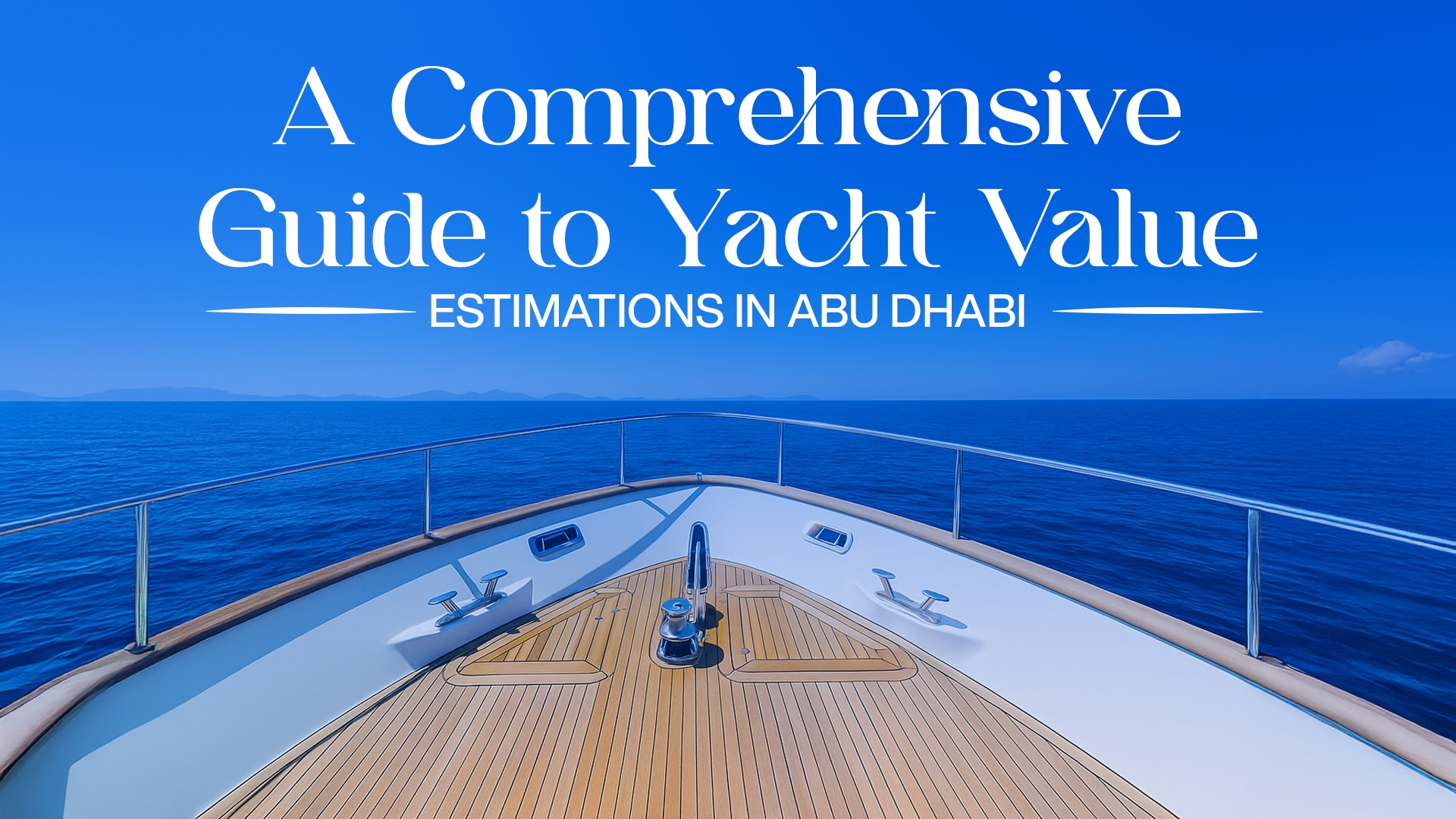- by Admin
- 16 August, 2025
- 7 min Read
A Comprehensive Guide to Yacht Value Estimations in Abu Dhabi
Owning a yacht is more than a lifestyle choice—it is also a significant investment. Just like luxury properties, yachts require periodic valuation to determine their worth accurately. In Abu Dhabi, where maritime culture blends with modern luxury, yacht value estimation are particularly important for owners, buyers, and sellers alike. Whether you are planning to sell, insure, finance, or simply understand the standing of your vessel, knowing the precise value of your yacht can make a remarkable difference.
In this guide, we will explore the key factors influencing yacht value, methodologies used for estimation, occasions when valuation becomes essential, specific challenges in the process, and the step-by-step procedure involved.
Key Factors Influencing Yacht Value
Several elements come together when determining the true worth of a yacht. These include:
1. Age and Condition
A well-maintained yacht, even if older, often holds more value than a neglected newer one. Regular maintenance, upgrades, and timely servicing increase resale potential.
2. Size and Type of Vessel
Larger yachts or those designed for luxury cruising generally hold higher valuations compared to smaller leisure boats. Superyachts, in particular, carry premium pricing due to exclusivity.
3. Brand and Builder Reputation
Certain shipyards and yacht builders are renowned for their craftsmanship. Yachts from brands like Sunseeker, Azimut, or Princess naturally command higher resale values.
4. Technology and Features
Advanced navigation systems, eco-friendly engines, stabilizers, and luxury interiors all add significant weight to valuation.
5. Market Demand
Seasonal demand in Abu Dhabi, especially during yachting seasons and events like Formula 1, can influence how much a yacht is worth.
6. Legal Compliance and Documentation
A yacht with complete Yacht Registration & Sefty Checks, valid insurance, and full compliance with UAE maritime laws is always valued higher than one with incomplete documentation.
Methodologies for Estimating Yacht Value
Yacht valuation is not guesswork—it is a systematic process carried out using various methodologies, including:
- Comparative Market Analysis (CMA): Examining recent sales of similar yachts in Abu Dhabi and international markets to benchmark pricing.
- Cost Approach: Evaluating the original purchase price, adjusting for depreciation, wear-and-tear, and upgrades.
- Income Approach: Less common but applied in cases where a yacht generates revenue (e.g., through charter services).
- Surveyor’s Inspection: A professional marine surveyor inspects the yacht physically, reviewing the hull, engines, navigation systems, and interiors to provide a detailed report.
Often, a blend of these methodologies is used to achieve the most accurate result.
Occasions for the Valuation of Boats and Yachts
Valuation is not a one-time requirement. Some of the most common occasions include:
- Before Buying or Selling: Ensures fair pricing and avoids over- or under-valuation.
- Insurance Purposes: Insurance companies require a professional valuation to determine coverage.
- Financing or Mortgaging: Banks and financial institutions may request valuation when offering loans.
- Inheritance and Legal Disputes: Accurate valuation is crucial for division of assets.
- Annual Maintenance Check-ins: Many owners request yearly valuations to stay updated on their asset’s standing in the market.
Specific Challenges in the Evaluation
Valuing yachts in Abu Dhabi comes with its unique set of challenges:
- Rapid Market Fluctuations: The luxury market is influenced by seasonal trends, tourism, and even global events.
- Customization: Many yachts are heavily customized. While this adds personal luxury, it can make valuation tricky as unique features may not appeal universally.
- Technological Obsolescence: Rapid advancements in navigation and eco-friendly propulsion mean yesterday’s cutting-edge system may lower today’s valuation.
- Documentation Gaps: Incomplete service logs or missing certifications often reduce credibility and thus value.
Procedure of a Yacht Valuation
The process of yacht valuation typically unfolds in structured stages:
- Initial Consultation: Understanding the owner’s purpose—sale, insurance, or legal need.
- Collection of Documentation: Registration papers, service logs, refit history, and certifications are reviewed.
- On-site Survey: A professional surveyor inspects the hull, machinery, safety systems, electronics, and interiors.
- Sea Trial (if applicable): Performance, stability, and fuel efficiency are tested in real conditions.
- Market Research: Analysis of similar yachts on the market to benchmark value.
- Final Valuation Report: A comprehensive document highlighting the yacht’s fair market value, depreciation, and recommendations for improving resale worth.
Frequently Asked Questions About Yacht Valuation
1. How often should a yacht be valued?
Ideally every 1–2 years, or whenever you plan a transaction, insurance renewal, or major refit.
2. How long does the valuation process take?
Depending on the size of the yacht, it can take anywhere from a few days to two weeks.
3. Who conducts yacht valuations in Abu Dhabi?
Certified marine surveyors and valuation specialists with expertise in regional and global markets.
4. Can upgrades significantly boost value?
Yes—especially safety, navigation, and eco-friendly upgrades. However, cosmetic changes may not always yield high returns.
5. What documents are essential for valuation?
Ownership certificates, insurance documents, maintenance logs, and classification society certifications are key.
